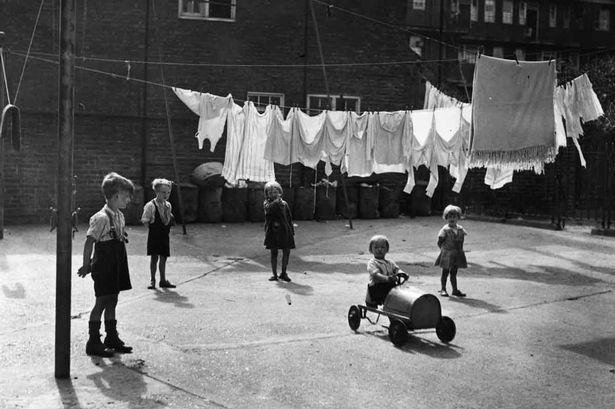Street Games (Part Two)

Starting street games and deciding who was ‘on’ was always an interesting thing to do. Round my
way in Milnrow we used to do ‘One potato’ but first say ‘Spuds up’ which meant that in a circle the
children would put up their fists. The ‘counter’ would start by counting themselves (touching your
own mouth was the way to do that) and then go round the raised spuds (fists) until someone was
left. The counting would be ‘One potato, two potato, three potato, four, five potato, six potato,
seven potato – MORE.’ This hand would be removed, and the rhyme started again. Whoever had a
fist left at ‘MORE’ was ‘on’ at whatever game was taking place. In some towns the counter was
known as the ‘dipper’ and this style of deciding who is ‘on’ takes on different forms throughout the
world. For example in Scotland the rhyme is ‘Olicka, bolicka, Susan solicka, Olicka bolicka, NOB.’
Of course one of the most popular of street games was Hide and Seek. Whilst one person counts
(often to 100 in 5’s) the others run away and hide. After counting, the seeker often used to shout
‘Coming ready or not !’ and go to look for everybody. (In Leicestershire they shouted ‘I hold my little
finger, I thought it was my thumb, I give you all a warning, And here I come !’) Each child caught, had
to stay with the catcher until everybody was caught. This game could go on for some time especially
if the others were well hidden. If the game had to be ended early – children might have been called
home – the seeker would sometimes call ‘All in ! All in !’ and the game was prematurely completed.
Then there was ‘What time is it Mr Wolf ?’ This game involves one child (the wolf) walking along the
street with the other children following behind. The children then cry out ‘What time is it Mr Wolf’
and the wolf says (for example) ‘Five O’clock.’ At that, the group of children get a bit nearer the back
of the wolf. The question is asked again and the wolf makes up another time of day. At one point
though, the answer comes from the wolf ‘Dinner Time !’ and the wolf turns quickly and tries to catch
one of the children who is then the wolf and everyone goes back to the start. Similar games are
played throughout Europe and beyond. In Cairo they shout ‘O Wolf, O Wolf, where are you going ?’
and the wolf eventually answers ‘To Eat you Up !’ as they chase the children.
One game which brought the sexes together of course was Kiss Catch. This was a variation on the
game of tig with the addition of boys chasing girls or vice versa and when caught they gave the other
a kiss. In the Opie’s research for their book on children’s games, one girl said that ‘according to
who’s chasing you, sometimes you run fast, sometimes you hardly run at all.’ I recall that if you
wanted to call a halt to any ‘tig’ game like this you could put up your thumbs and say ‘Barley’ which
may have been a corruption of ‘Parlez’ or a wish to talk or negotiate.
One game more often played by girls than boys was ‘Queenieo-coco.’ This involved one child being
‘it’ who threw a small ball behind her so that someone (unseen) would catch it. The ball would then
be hidden behind someone’s back and the person ‘on’ turns round. The larger group, often in a line,
then chanted ‘Queenieo-coco who’s got the ball ? I haven’t got it. It isn’t in my pocket, Queenieo-
coco who’s got the ball ?’ A person is picked as having the ball and if correct stays as ‘Queenie’ but if
a wrong girl is picked, the one who was successful in hiding it takes her place. In Lincoln a similar
game is called ‘Ellabella, Cinderalla’ but is played in more or less the same way.
Whilst the girls were playing Queenieo-coco, the boys, somewhere where there was a grassy place
might be playing ‘Split the Kipper.’ Although seeming dangerous, this was a popular game played
with a knife, often a sheath knife. Two boys would face each other with feet together and one would
throw the knife and make it stick into the ground within a few inches off the other boy’s foot. This
boy would then have to stretch out his leg and put his foot where the knife landed. It was his turn
then and the stretch between the legs established for both. If you threw the knife between the legs
of the other boy you could start again. This was ‘splitting the kipper’. If one of them couldn’t stretch
to put his foot where the knife landed or fell over when trying, they lost. Stories of mill-lads playing
this game with spindles sends a chill down the spine but they would have been wearing clogs !
A less dangerous and mixed gender contest involved lolly sticks. After eating an ice lolly, the wooden
sticks could be used in competition. One child held their stick horizontally between both hands
whilst the opposing child whacked the stick with their stick, holding it with a stiff index finger for
strength. If the other child’s stick didn’t break, it was their ‘go’ and this continued until one of the
sticks broke under a hit. A similar contest but without lolly sticks was ‘Knuckles’ where children
(usually boys) would face off one fist against another. Having ‘goes in turns,’ each would try to strike
the other’s knuckle although if you moved your fist quickly you could avoid being struck. The loser
was the one who gave in first or the bell or whistle went to end playtime !
